#Emirati Banking
Explore tagged Tumblr posts
Text
Best Premium Banking Services in UAE
PRO Banking offers a range of banking solutions to suit your needs.Choose PRO Banking for Personal Loans,Investments,Insurance and much morePro Banking UAE is an individual bank in the computerized age that assumes a serious part in the public eye with commitment.The computerized age assists us with carrying banking nearer and nearer to our clients and their requirements.As a bank, we base on inclusivity, sensibility, social business, improvement & regular banking to say the least
#Bank Account#UAE bank account#Credit Card#Loans#Personal Loan#Business Loan#Investments#Car Loan#Company Setup#Insurance#Accounts#Emirati Banking#Banking Services#Mortgage
0 notes
Text
Here's what the situation looks like on the ground (bear in mind I'm not exactly an expert in war).
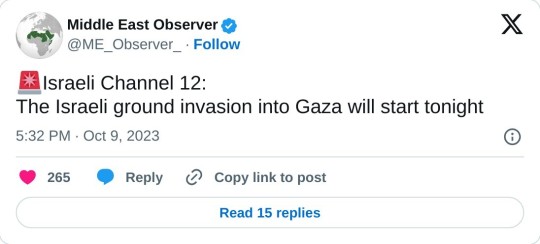
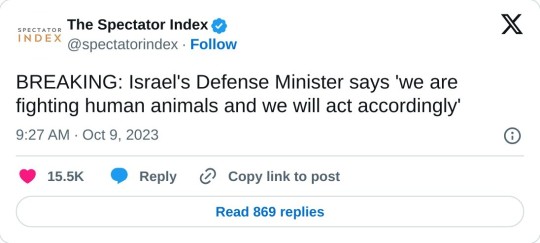
The Palestinian resistance fighters (it's not just Hamas you guys, every Palestinian militia is fighting right now) have been baiting Israeli forces into a ground battle ever since the operation started. IDF isn't exactly the best at on the ground battles which is why they usually prefer using their air force and long distance artillery. And also because Iran and Lebanon have indicated they will join the war if there's a ground operation in Gaza.

In preparation for this, Hamas and other groups have struck military bases and have taken equipment back to Gaza. In addition to weapons from Iran and Hezbollah, the fighters now have Israeli military weapons in their possession and they've been using them.
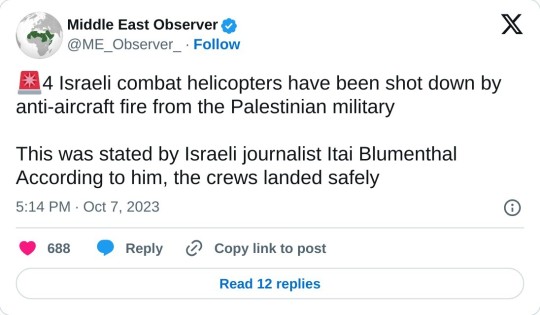
So far, Palestinian fighters seem to be achieving their objectives.
The Israeli response to the attack has been chaotic, careless and haphazard, something that has angered Israeli citizens. It took them hours to organise a coordinated response. The Iron Dome was rendered useless as thousands of rockets were launched into Israel.


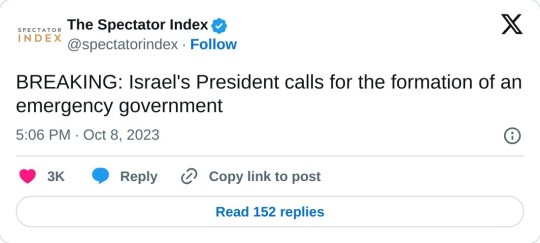
There has been multiple reported cases of high ranking officers being killed

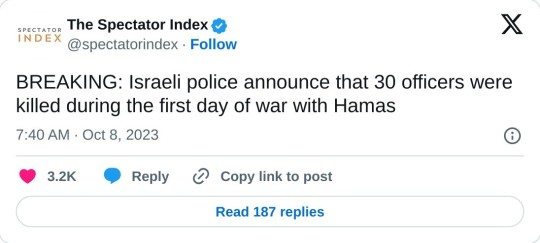
Many Arab military groups have either joined in or announced that they will join the fight so we might be looking at a regional war here.
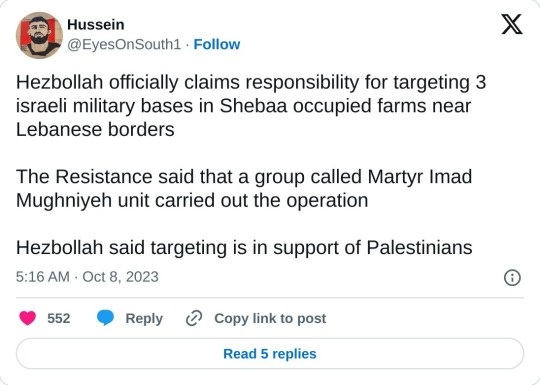


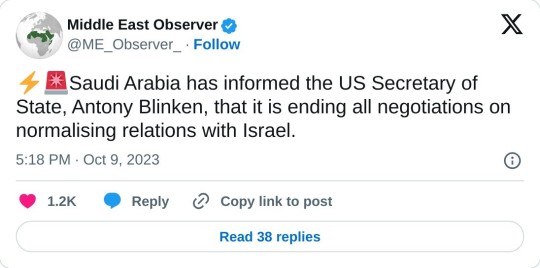
This by the way is a big blow to Israel. It, alongside the US, has been working to normalise relations with Saudi and Emirati States like UAE.
So how long will this conflict last? All indicators point to 'a long while.'

The Israeli government has said this will be a long, difficult war for them.
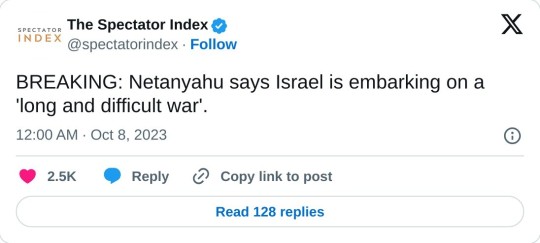
Hamas has refused a ceasefire and is also prepared for a long conflict in Gaza and other Occupied territories (I've seen people say there's no fighting in the West Bank and that this is a Hamas only operation but that's not true)

I don't know what is going to happen next but I also don't think Israeli forces are going to crush Palestinian fighters quickly like a lot of people are expecting.

The casualties are already very high.
This is shaping up to be a very bloody conflict on both sides.
606 notes
·
View notes
Text

Un’Europa sottomessa e senza bussola
Gli europei non si accorgono neppure più dove stanno andando, o forse fanno finta di non saperlo: sono un po’ sonnambuli e un po’ sottomessi al loro destino. Siamo all’agonia della politica estera comune europea, che per altro non è mai esistita, cullando nel settore difesa l’idea di una Banca per il Riarmo destinata a divorare altre risorse. Hanno sempre seguito l’agenda americano-israeliana, dall’Est Europa al Medio Oriente, e ora ne pagano le conseguenze.
La loro disonestà è tale da pensare che la guerra in Ucraina sia cominciata il 24 febbraio 2022 e non quando, nel gennaio 2014, il sottosegretario di Stato Usa Victoria Nuland, in una conversazione con il suo ambasciatore a Kiev, pronunciò la ormai famosa frase «Fuck the Eu», letteralmente «l’Unione europea si fotta».
Si discuteva ancora di un accordo tra il governo ucraino del filo-russo Viktor Janukovich e l’opposizione. Allora non c’era Trump alla Casa bianca ma Barack Obama e il suo vice era Joe Biden, che accorse a Piazza Maidan a celebrare il primo anniversario delle proteste mentre suo figlio Hunter guadagnava milioni di dollari in Ucraina nel settore energetico. E ora vorremmo stupirci se Trump trascina Zelensky a firmare l’accordo multi-miliardario sulle terre rare mentre Putin, diventato ormai a Washington un «volenteroso dittatore», si offre di portargli quelle in possesso dei russi? Chi più ne ha più ne metta mentre ognuno si fa i propri conti in tasca e Macron, nella sua visita da Trump, reclama che l’Europa ha versato all’Ucraina il 60 per cento degli aiuti, più degli Stati uniti.
Ma il presidente americano si tappa le orecchie: questa guerra, nonostante le copiose commesse all’industria bellica americana, è un «cattivo affare» e bisogna chiuderla. C’è da pensare alla Cina. A raccontare la favoletta della «pace giusta» ormai insistono solo i giornali del mainstream, spiazzati dagli eventi. Ma quale pace giusta? Gaza e la Palestina sono la prova che in Europa non ci crede nessuno.
La sottomissione europea al complesso militar-industriale israelo-americano è totale. Pochi giorni dopo il massacro di Hamas del 7 ottobre, Biden spostava le portaerei nel Mediterraneo orientale e stanziava miliardi di dollari di aiuti militari per Israele: gli Stati uniti si sono immediatamente schierati non per la pace ma per una escalation del conflitto. E noi europei con loro, mascherando i nostri aiuti a Israele dietro la ormai sfiorita formula «due popoli e due stati». Il complesso militar-industriale israelo-americano si è schierato all’Onu con Putin e le dittature perché tra un po’ gli Usa riconosceranno l’annessione israeliana della Cisgiordania.
Chiediamo giustamente a Putin di ritirarsi dai territori occupati in Ucraina ma Israele occupa il Libano, ha esteso la sua presenza nel Golan siriano e si sta divorando la West Bank. Giustifichiamo tutto questo con la necessità di Israele di preservare la sua “sicurezza”, le stesse argomentazioni che usa Putin quando chiede alla Nato di tenersi lontana dall’Ucraina. Non è un caso che contro la risoluzione all’Onu che difendeva l’integrità territoriale dell’Ucraina abbiano votato contro Usa e Israele insieme a Russia, Bielorussia, Mali, Nicaragua, Corea del Nord e Ungheria (Iran e Cina si sono astenuti, si presume per la vergogna).
Il Consiglio di Sicurezza ha poi approvato una brevissima risoluzione degli Stati uniti che chiede la «rapida fine della guerra», senza però citare la Russia come aggressore e senza far riferimento alla sovranità territoriale di Kiev. Francia e Gran Bretagna, che avrebbero potuto porre il veto, hanno preferito astenersi, spianando la strada alla versione di Trump che piace tanto a Israele. Da notare il doppio binario dell’Italia. Stiamo con l’Unione europea ma Meloni, con la scusa del Forum con gli Emirati, si è sfilata dalla cerimonia di Kiev per il terzo anniversario della guerra: prendiamo 40 miliardi di dollari di mancia dagli sceicchi membri del Patto di Abramo con Israele e la premier incassa le lodi sperticate di Trump.
Cosa volete di più? È il manuale della giovani marmotte di Trump. La Ue paga anni di sottomissione a Usa e Israele: Trump è l’anello mancante di decenni in cui abbiamo giustificato, partecipato o avallato guerre di occupazione e aggressione, dall’Iraq alla Libia, dall’Afghanistan alla Palestina, provocando la disgregazione di interi paesi e popoli, centinaia di migliaia di morti e milioni di profughi. Basti pensare all’Iraq nel 2003, dove tra i soldati si contava pure un nutrito contingente di ucraini. Fu un conflitto per «esportare la democrazia» che ha precipitato la regione nell’anarchia e nel terrorismo integralista più feroce.
In un momento in cui ci si indigna per le bugie e i travisamenti della realtà di Trump, bisogna ricordare che la guerra del 2003 fu la più grande fake news della storia recente, quando gli Usa giustificarono l’attacco con una campagna di stampa e propaganda mondiale che sbandierava il possesso da parte di Saddam Hussein di armi di distruzione di massa che non furono mai trovate. Venne persino esibita all’Onu dal segretario di stato Powell una falsa provetta con armi chimiche. Una tragica commedia. Nessuno dei responsabili ha mai pagato – né Bush né Blair – e abbiamo partecipato a quella guerra e alle altre senza fiatare. Ora ci tocca accettare le bugie di Trump e gli insulti del suo vice Vance a Monaco: sanno con chi hanno a che fare. I sottomessi europei. Alberto Negri, ilmanifesto.it, 26/02/2025
43 notes
·
View notes
Text
Efforts will focus on rebuilding infrastructure, restoring services, and re-establishing Palestinian Authority institutions. It will also aim to complete Palestinian reconciliation, by starting a dialogue between Fatah and Hamas to achieve a consensus that ensures Hamas' acceptance of the committee and the international mission. The document indicates a timetable for initial steps, including issuing a presidential decree to form a new Palestinian Authority government and establishing a Gaza committee.
The plan has been pushed by the UAE for months, and the US has been receptive to it. Axios says, "Israeli officials say Netanyahu liked many parts of the Emirati plan but opposes the more politically-charged aspects, particularly the involvement of the Palestinian Authority in Gaza and the two-state solution vision."
But the response from the PA was a resounding "no." Not a "we'll study it," not a "it has interesting ideas that we may want to keep." Just "strong opposition" to the plan that would force them to eliminate corruption.
So what's their plan? They don't have one.
They haven't said anything except for rejecting every other idea. They don't want any responsibility for governing Gaza - or the West Bank, to be honest. They want the trappings of government without any of the hard work.
The reason is that the PA likes having Hamas in charge of Gaza. It gives them an excuse for not solving problems. It allows them to pretend to be the "good cop" in the region and be honored as a real government of a real state. They like Hamas terrorism. They tacitly supported October 7.
The PA's goals have always been to destroy Israel, and any plan that allows Israel to continue to exist and to be able to defend itself is unacceptable.
Rejectionism is much easier than governing. Especially when the entire idea of a Palestinian state has always been to eventually replace Israel, not to live side by side with it.
51 notes
·
View notes
Text
Mariam Mansour, a Palestinian woman, tells her story of going through childbirth in Gaza during this genocide,
"I never imagined that my child's birth will be in tents, displaced as we are, helpless, humiliated, and desperate. After more than 100 days of displacement, tiredness, and hard days along with the hardship of pregnancy, i can only say that our souls dissipated. On the 15th of January 2024 and in the Emirati Hospital in Rafah, which treats about two-thirds of the bank with indescribable difficulty, I was among dozens of women going through labor. I had to wait in a chair like many others waiting for an empty bed. After two hours, they finally found a bed for me to go and suffer through my labor without help or care. Not even a cover. I cried a lot because of the cold and my helplessness and the helplessness of those around me. You can't even find the communications to call a keen and tell them what you need or where you are.
But child birth is a miracle by Allah's care and bless.
After my child was born, there was no place for me to wait for postpartum care or even a cover to help me against the stabbing cold. I had to take some painkillers and leave at 12 midnight in a cab to go an even colder tent. The cab wasn't allowed to go into the refugees area. It was a long distance and I couldn't walk or even stand.
I found an injured young man in a wheelchair. He felt sorry for me and gave me his chair.
I went back to the far, far away cold tent in the long night to face another challenge with my newborn girl, trying to forget our primitive rights of water, food, and clothes"

#palestine#free palestine#gaza#israel#free gaza#palestinian lives matter#social justice#genocide in gaza#jerusalem#save palestine#bisan owda#feminism#women's rights#endisraelsgenocide
175 notes
·
View notes
Text
2024 team sponsors recap!
this is completely irrelevant to F1 but i study and do these stuffs for a living sooo 😩😩 2023 sponsors are based on the sponsors that are there at the beginning of the season (new sponsors that join in the middle of the season will be classified as 2024's)
Mercedes AMG Petronas F1 Team:
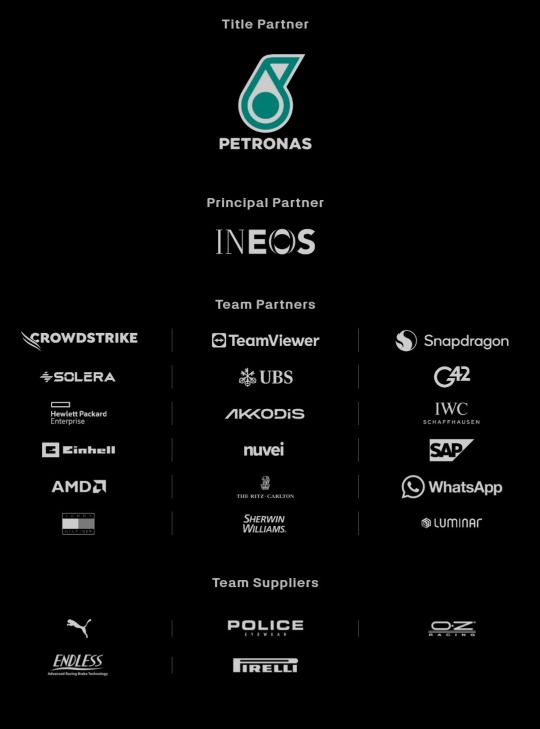
New sponsors: Whatsapp, Luminar (American tech company), SAP (German software company), nuvei (Canadian credit card services), Sherwin Williams (American painting company) 2024 data last update: 2024/02/14
Old sponsors that left: Monster Energy, Pure Storage (American technology company), fastly (American cloud computing services), Axalta (American painting company), Eight sleep (American mattresses company) 2023 data last update: 2023/01/07
Oracle Red Bull Racing F1 Team:
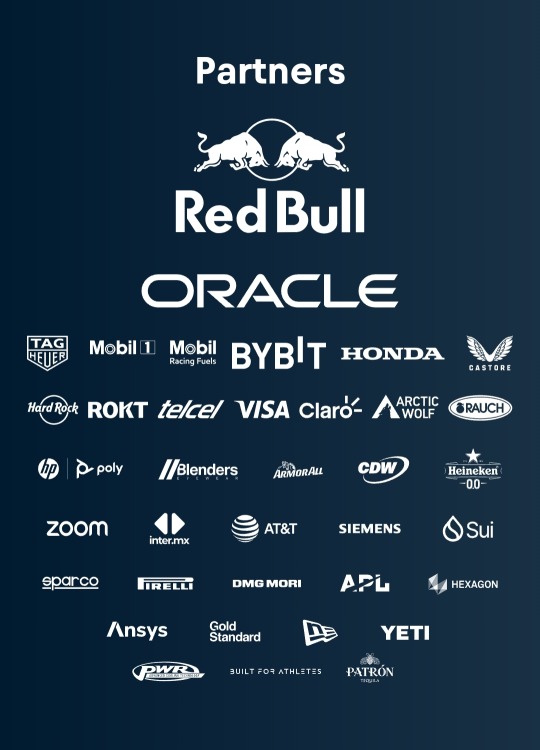
New sponsors: Yeti (American cooler manufacturer, joined later in 2023), APL (American footwear/athletic apparel manufacturer, joined later in 2023), CDW (American IT company, joined later in 2023), Sui (American tech app by Mysten Labs, joined later in 2023), Patron Tequila (Mexican alcoholic beverages company, joined later in 2023) 2024 data last update: 2024/02/15
Old sponsors that left: CashApp, Walmart, Therabody (American wellness technology company), Ocean Bottle (Norwegian reusable bottle manufacturer), PokerStars (Costa Rican gambling site), Alpha Tauri (? no info if they're official partners or not but Austrian clothing company made by Red Bull), BMC (Switzerland bicycle/cycling manufacturer), Esso (American fuel company, subsidiary of ExxonMobil), Hewlett Packard Enterprise (American technology company) 2023 data last update: 2023/03/07
More: Esso is a subsidiary of Mobil so there's possibility they merged or something
Scuderia Ferrari:
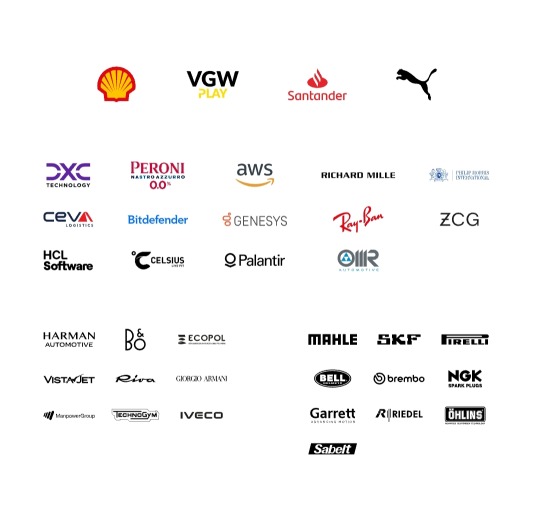
New sponsors: VGW Play (Australian tech game company, joined later in 2023), DXC Technology (American IT company, joined later in 2023), Peroni (Italian brewing company), Z Capital Group/ZCG (American private asset management/merchant bank company), Celsius (Swedish energy drink manufacturer) 2024 data last update: 2024/02/15
Old sponsors that left: Mission Winnow (American content lab by Phillip Morris International aka Marlboro), Estrella Garcia (Spanish alcoholic beverages manufacturer), Frecciarossa (Italian high speed train company) 2023 data last update: 2023/02/16
More: Mission Winnow is a part of Phillip Morris International. They are no longer listed as team sponsor but PMI is listed instead.
(starting here, 2023 data last update is 2023/02/23 and 2024 data last update is 2024/02/15)
McLaren F1 Team: (Only McLaren RACING's data is available idk if some of these are XE/FE team partners but anw..)
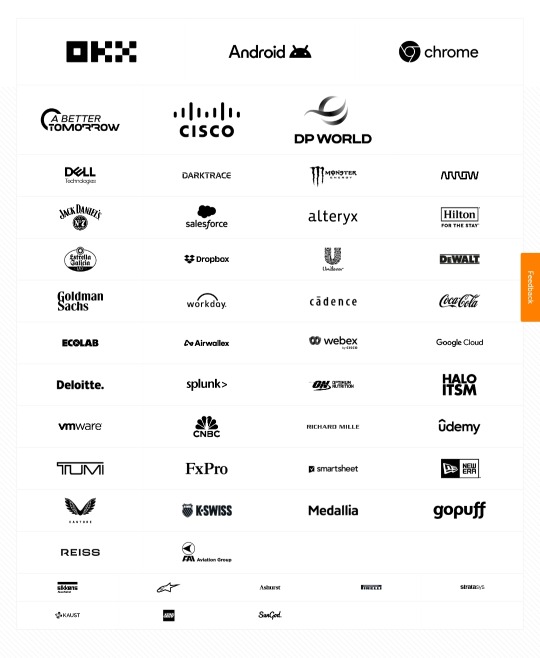
New sponsors: Monster Energy, Salesforce (American cloud based software company, joined later in 2023), Estrella Garcia (Spanish alcoholic beverages manufacturer), Dropbox (American file hosting company), Workday (American system software company, joined later in 2023), Ecolab (American water purification/hygiene company), Airwallex (Australian financial tech company), Optimum Nutrition (American nutritional supplement manufacturer), Halo ITSM (American software company, joined later in 2023), Udemy (American educational tech company, joined later in 2023), New Era (American cap manufacturer, joined in 2023), K-Swiss (American shoes manufacturer, joined later in 2023), Alpinestars (Italian motorsports safety equipment manufacturer)
Old sponsors that left: DP World (Emirati logistics company), EasyPost (American shipping API company), Immersive Labs (UK cybersecurity training company?), Logitech, Mind (UK mental health charity), PartyCasino (UK? online casino site), PartyPoker (American? gambling site), Sparco (Italian auto part & accessory manufacturer), Tezos (Switzerland crypto company)
Aston Martin Aramco F1 Team:
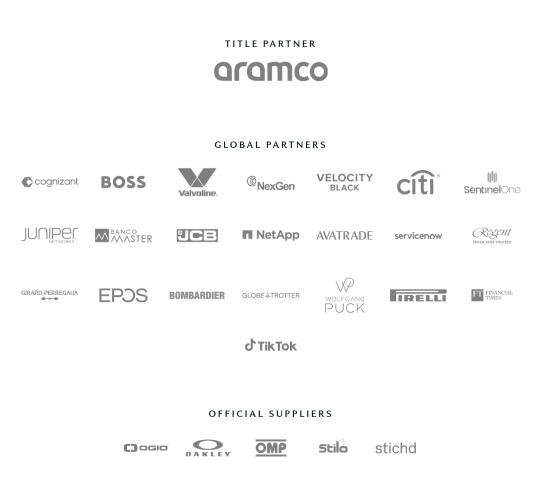
New sponsors: Valvoline (American retail automotives service company, joined later in 2023), NexGen (Canadian sustainable? fuel company), Banco Master (Brazilian digital banking platform, joined later in 2023), ServiceNow (American software company, joined later in 2023), Regent Seven Seas Cruise, Wolfgang Puck (Austrian-American chef and restaurant owner, joined later in 2023), Financial Times (British business newspaper), OMP (Italian racing safety equipment manufacturer), stichd (Netherlands fashion & apparel manufacturer)
Old sponsors that left: Alpinestars (Italian motorsports safety equipment manufacturer), crypto.com (Singaporean cryptocurrency company), ebb3 (UK? software company), Pelmark (UK fashion and apparel manufacturer), Peroni (Italian brewing company), Porto Seguro (Brazilian insurance company), Socios (Malta's blockchain-based platform), XP (Brazilian investment company)
Stake F1 Team (prev. Alfa Romeo):
???? Can't found their website (might be geoblocked in my country???)
BWT Alpine F1 Team:
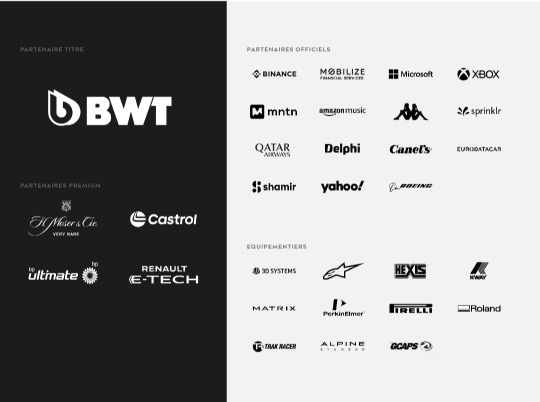
New sponsors: MNTN (American software company), H. Moser & Cie (Switzerland watch manufacturer), Amazon Music
Old sponsors that left: Bell & Ross (French watch company), Ecowatt (??? afaik French less-energy smthn smthn company), Elysium (French? American? Software company), KX (UK software company), Plug (American electrical equipment manufacturing company)
Visa CashApp RB F1 Team (prev. Scuderia Alpha Tauri):
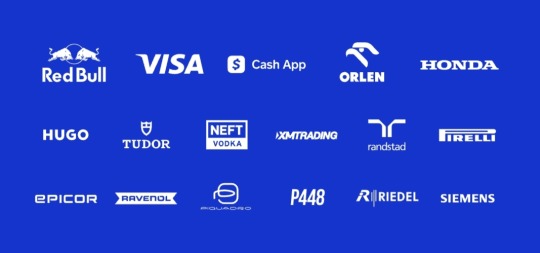
New Sponsors: Visa, CashApp, Hugo Boss, Tudor, Neft Vodka (Austrian alcoholic beverages company), Piquadro (Italian luxury bag manufacturer)
Old sponsors that left: Buzz (?), Carl Friedrik (UK travel goods manufacturer), Flex Box (Hongkong? shipping containers manufacturer), GMG (Emirati global wellbeing company), RapidAPI (American API company)
Haas F1 Team:

New sponsors: New Era (American cap manufacturer, joined later in 2023)
Old sponsors that left: Hantec Markets (Hongkong capital markets company), OpenSea (American NFT/Crypto company)
Williams Racing:

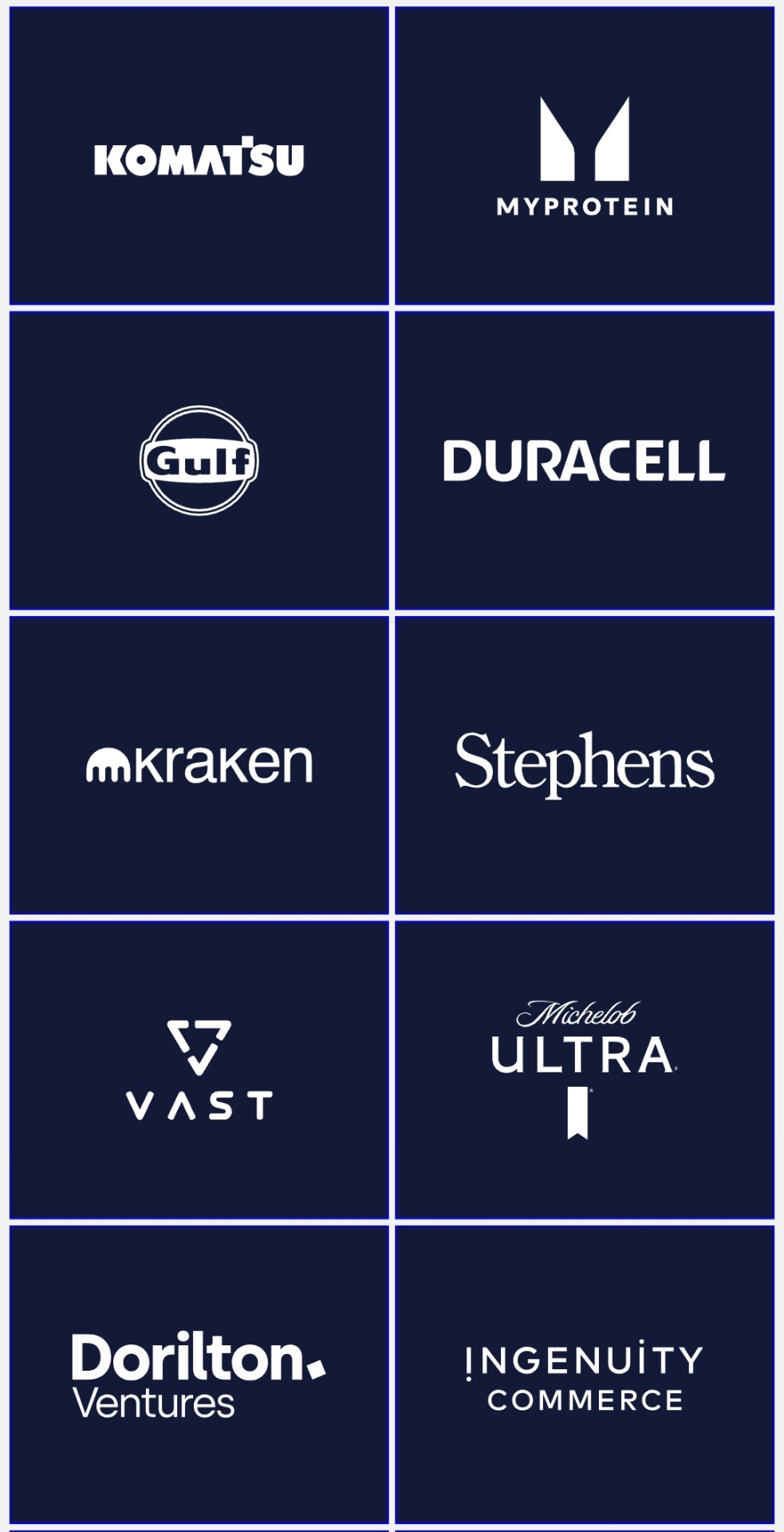
New sponsors: Komatsu, MyProtein (British bodybuilding supplement), Kraken (American crypto company, joined later in 2023), VAST Data (American tech company), Ingenuity Commerce (UK e-commerce platform), Puma (joined later in 2023)
Old sponsors that left: Acronis (Swiss software company), Bremont (British watch manufacturer), Dtex Systems (American? cybersecurity company), Financial Times (British business newspaper), Jumeirah Hotels & Resorts, KX (UK software company), OMP (Italian racing safety equipment manufacturer), PPG (American painting manufacturer), Umbro (English sports equipment manufacturer), Zeiss (German opticals/optometrics manufacturing company)
#mercedes amg petronas#red bull racing#scuderia ferrari#visa cash app rb#haas f1 team#mclaren f1#aston martin#alpine f1#williams racing#stake f1 team#f1#ari's rant#sponsor talks
42 notes
·
View notes
Text










Each image lists the casualties in columns left to right for Israel, Gaza, and the Occupied West Bank; deaths in the top row, injured in the second.
Notice anything weird about these numbers?
1400. That number has been thrown around since the beginning. But weirdly enough we didn’t actually get to 1400 in the official count until 10 days after Oct 7th. At which point the Gazan death toll had long exceeded this number. And then…. It stagnates.
The number of Palestinian casualties, both deaths and injuries, continues to rise every single day (i couldn’t include every graphic due to tumblr’s image limit).
The Israeli death toll remains 1400. Until, on Nov 16, it is updated. To 1200. Because approximately 200 of them were Hamas corpses burnt beyond recognition.
It wasn’t 1400 when Israel launched its retaliation. And it’s still not 1400 now, 45 days later.
An unknown number of the “verified” 1200 are confirmed to have been killed by friendly fire from the IOF. And among those 1200, about half or more were IOF or police. There were at most 600 civilians.
So my question is, if Israel wants to justify its genocidal carnage by claiming that Hamas massacred civilians, tell me exactly how many civilians Hamas killed. And how many did Israel kill?
And if Israel turns out to be responsible for more deaths on Oct 7th than Hamas, what will you zionist fuckwads say to the 13 THOUSAND Gazans and counting who have been killed?
The 1.5million who have been displaced?
The thousands now dying of cholera, one of the most treatable plagues, because the treatment is clean water and salt, and there is none to be had of either?
What will you say to the 5.5 thousand dead children, the 1.7 thousand lost under rubble, the 3 children that were killed in the time it took me to write this post, and the 8 premature infants that died because Israel decided to besiege every hospital in the territory?
Don’t you dare say that this is being done to free Palestine from terrorists. The only ones inflicting terror on Palestine right now are the Israeli occupation.
Edit: only 8 of the 39 Al-Shifa premies have died, 28 have been evacuated to Egypt, and 3 remain in the Emirati hospital at the Rafah border.
37 notes
·
View notes
Text
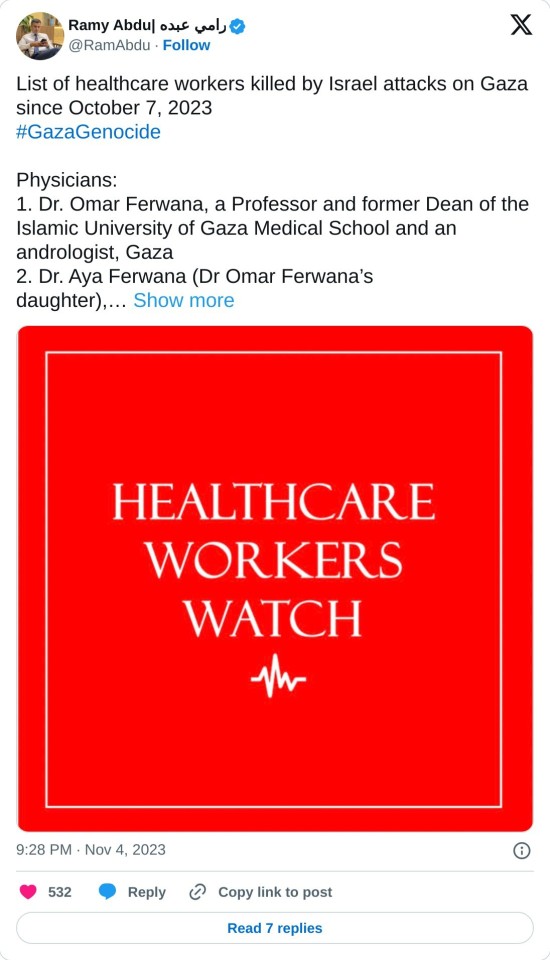
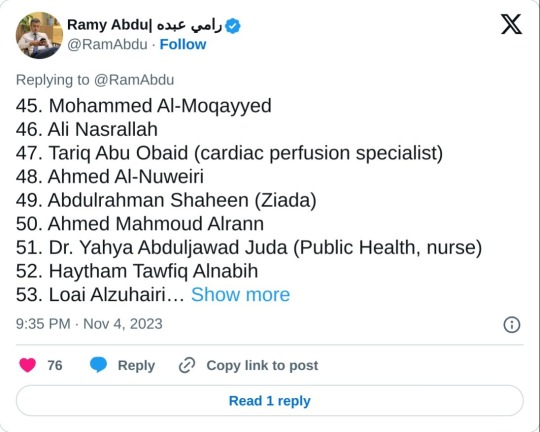
List of healthcare workers killed by Israel attacks on Gaza since October 7, 2023
Physicians:
Dr. Omar Ferwana, a Professor and former Dean of the Islamic University of Gaza Medical School and an andrologist, Gaza
Dr. Aya Ferwana (Dr Omar Ferwana’s daughter), a family medicine specialist, Gaza
Dr. Medhat Saidam, a senior burn and plastic surgeon, Shifa Hospital, Gaza and MSc in Burn Care alumnus from Queen Mary University of London
Dr. Mohammed Dabour, a consultant pathologist and dean of pre-clinical medicine at the Islamic University of Gaza Medical School
Dr. Tamer Al-Khayyat, an anesthesiologist and intensivist, European Gaza Hosptial, Rafah
Dr. Mahmoud Al-Khayyat, an internist in Rafah and Dr Tamer Al-Khayyat’s father
Dr. Razan Al-Rakhawi (Dr Tamer Al-Khayyat’s wife), an obstetric and gynecologist, Emirati Women’s Hospital, Rafah
Dr. Sereen Al-Attar a consultant obstetric and gynecologist at Nasser Hospital, Khan Younis and an Assistant Professor at the Islamic University of Gaza Medical school
Dr. Saeed Drabieh, a urology resident, Shifa Hospital
Dr. Mohammed Al-Samarai, Iraqi volunteer intern physician
Dr. Rafat Abou Foul, radiologist, Beit Hanoun Hospital
Dr. Amal Al-Maqadma, family medicine specialist, Rafah
Dr. Ibtihal Al-Astal, intern doctor, Khan Younis
Dr. Duaa Awad, emergency medicine doctor, Al-Aqsa Hospital
Dr. Moath Nabaheen, emergency medicine doctor, Al-Aqsa Hospital
Dr. Youssef Jadallah, intensivist and anesthesiologist (based in Germany, from Gaza but was visiting his family)
Dr. Inas Yousef, emergency medicine doctor, Al-Aqsa Hospital
Dr. Israa Al-Ashqar, anesthesiology resident, Shifa Hospital, Gaza
Dr. Abdallah Ashour, emergency medicine doctor, Nasser Hospital, Khan Younis
Dr. Hamam El-Deeb, orthopaedic surgery resident, Shifa Hospital, Gaza
Dr. Munther Abu Sariya, consultant pediatrician, Mohammed Al-Durra Pediatric Hospital
Dr. Doaa Shammout, pediatric resident, Rantisi Hospital, Gaza
Dr. Baraa Abu Elaish, intern doctor, Gaza
Dr. Abdlallah El-Helou, general practitioner/internal medicine doctor, Indonesian/Beit Hanoun Hospital
Dr. Muhannad Ezzo Afana, general practitioner, Gaza
Dr. Mohammed Refaat Mekki,
Dentists:
Dr. Ahmed Al-Hourani
Dr. Nada Mahdi
Dr. Ibrahim Al-Dali
Dr. Bilal Lubbad
Dr. Marwa Swelim
Dr Areej Eid
Dr. Tawfiq Al-Farra
Dr. Abdallah Baghdadi
Dr. Jameel Tarazi
Dr. Maysoon Al-Nuweiri
Dr. Mona Dughmush
Dr. Noha Dughmush
Dr. Mamoun Afana
Dr. Mohammed Afana
Dr. Anis Mekki
Dr. Tasneem Abdulnabi
Medical/dental students:
Bisan Halasa
Shaimaa Saydam
Abedelrahman Abu Shammala
Nour Al-Ashqar
Yaseen Al-Akhras
Osama Abu Safia
Duha Dughmush
Haneen Al-Shannat
Abdallah Abu Jayab
Zainab Azzam
Mohammed Abu Jiadan
Medical Scientists:
Prof. Salah El-Din Zanoun
Prof. Ahmed Al-Dalo
Prof. Ameed Mushtaha (Head of laboratories department and blood banks
Nurses:
Mohammed Lubbad
Mohammed Al-Azzaiza
Ahmed Moshtaha
Rami Lubbad
Somaya Temraz
Mohammed Rafat Gomaa
Osama A'eed Abu Safiya
Saber Al-Nimnim
Mohammed Hamad
Mohammed Al-Baz
Suleiman Abu Zour
Badr Mohammed Abu Daqah
Shaimaa Rayan (Midwife)
Maryam Abou Daher
Kefah San’allah
Walaa Adwan (Midwife)
Rawaa Al-Thalathini (Midwife)
Samah Rasheed (Midwife)
Rida Al-Masri (Midwife)
Ibrahim Abou Isaac
Amjad Abou Ouda
Ibrahim Al-Farra
Aya Al-Shrafi
Tamer Al Efesh
Momen Mansour
Asmaa Al-Asar
Feras Ftaiha
Diaa Bardaweel
Rana Shalaby
Itemad Miqdad
Zainab Al-Sharafi
Hamdan Malaka
Suheer Jbara
Hassan Al-Hennawi
Sabha Al-Sherafi
Azmi Al-Jamal
Yousef Al-Shareef
Hadeel Fanqa
Emad Esleem
Enas Al-Zeen
Heba Salamah
Nuha Esleem
Amro Masoud
Hanya Qudaih
Mohammed Al-Moqayyed
Ali Nasrallah
Tariq Abu Obaid (cardiac perfusion specialist)
Ahmed Al-Nuweiri
Abdulrahman Shaheen (Ziada)
Ahmed Mahmoud Alrann
Dr. Yahya Abduljawad Juda (Public Health, nurse)
Haytham Tawfiq Alnabih
Loai Alzuhairi (Nursing student)
Saleem Abu Zour
Waleed ElMahalawi
Rola Althalathini (Midwife)
Duaa Ashour
Amer Elramlawi
Safa Zeino
Saja Doghmosh
Moayad Ezzo Afana
Ramadan Doghmosh
Moemen Arab (Nursing student)
Oun Nofal Ashour (Nursing student)
Paramedics (EMS providers):
Marwan Abou Raida
Hatem Awad
Khalil Al-Sharif
Ahmed Al-Dahman
Yousri Al-Masri
Ahmed Abdel Rahman
Mohammed Al-Ghaliz
Mohammed Ali
Iyad Salim
Abdelrahim Abou Baid
Alaa Abou Ghanima
Naji Al Fayoumi
Mohammed Qateet
Tareq Ashour
Mahmoud Abou Mashayekh
Nafeth Al-Natour
Mahmoud Othman
Mohammed ElOmour
Ibrahim Matar
Yasser Alnaseri
Physiotherapists:
Ahmed Al-Masri
Ahmed Sameh Abou Herbeed
Shaimaa Sbaih
Mayar Al-Wahidi
Ahmed Ashraf
Shahrazad Al-Akhras
Nour Ibrahim
Pharmacists:
Ahmed Al-Jerjawi
Aziz Elfarra
Afnan Al-Astal
Shereen Abou Jazar
Eman Abu Al-Jalil
Safaa Hasouna
Ibraheem Meqdad
Mohammed Ali
Maysaa Khader
Nisreen Al-Dammagh
Sally Al-Aydi (Pharmacy student at AlAzhar University)
Mohammed Al-Shannat
Lina Abu Mualaileq
Noor Ibean
Haneen Albasyouni
Amira Dahman
Rawand Albanna
Khaled Abu Ma’ala
Amal Mekki
Abdullah Altartori (Pharmacy student at AlAzhar University)
Asmaa Abu Salah (Pharmacy student at AlAzhar University)
Mohammad Alshami
Lab technicians/clinical microbiologists:
Natheer Shaban
Asmaa Hijazi
Rawan Yassin
Alia Al Hinnawi
Maryam Kabaja
Nahid Abdullatef
Mohammed Abu Karsh
Mohammed Shabaan
Riham Elkahlout
Ismail Sharaf
Taiseer Alghouti
Abdulmohsin Abu Alrous
Duaa Jad Allah
Optometrists:
Omar Khorsheed
38 notes
·
View notes
Text
News of the Day 2/25/25: Israel, Gaza and the West Bank
Last week Israel moved tanks into the West Bank for the first time in two decades. The West Bank is a bit like Gaza: a Palestinian territory with some degree of local self-government, but ultimately controlled by Israel. So it's probably not unparalleled to have some Israeli military there, sadly, but a big increase like this .... isn't a good sign, in a big way. It's definitely worth keeping an eye on.
Israel deploys tanks to the West Bank for the first time since 2002. Al-Jazeera discusses why (12ft.io).
Two Palestinian boys were shot by Israeli forces in the West Bank. A child rights organization says they were "targeted." (RP)
The NY Times reports Palestinian displacement from the West Bank is the highest since 1967. (RP)
(This is sensitive stuff, and if I'm misrepresenting the exact relationhip between Israel and the West Bank, or Gaza for that matter, correct me. It's late when I'm writing this and it's been a difficult day.)
Meanwhile, in Gaza, Trump continues to talk like he can just relocate the Palestinians and turn it into a real estate development; the other Arab nations now have a common enemy; and the Israel-Hamas peace deal hangs on by the gossameriest of threads, though it is still kicking. In this corner of the world that's not nothing.
Trump wants to own Gaza. The WSJ asks who owns it now? (RP)
Trump threatens to cut off US foreign aid to Egypt, Jordan if they don't accept Gazans. (RP)
Experts say Trump's attempts to force Jordan, Egypt to accept Gazan refugees could lead to new alliances in the Middle East, particularly with Saudis and Emiratis.
Al-Jazeera discussed how Israel had not complied with the agreement the prior week (RP), which led to Gaza's threat not to release hostages this weekend.
Trump had demanded all Israeli hostages to be released, or else there'd be "hell to pay." Gaza released three hostages on 2/15 as planned, but some hostages still remain in Gaza.
On how Trump's Gaza comments are encouraging Netanyahu to be more hardline. (RP)
Rubio expresses support of Trump's Gaza plan during visit to Israel, and other details of US-Israeli cooperation since Trump's divisive comments. (RP) (... Yeah.)
Haaretz: "The Weird, Fraudulent and Immoral 'Justifications' for Trump's Gaza" (RP)
Netanyahu hails Trump's plan to "rebuild" Gaza, Israeli Defense unveils agency to "assist" with departures from Palestinian territories. (12ft.io)
Poll finds 68% of Israeli approve of relocating Gazans. (12ft.io) Do consider the source on this one; NY Post is a conservative paper, and I don't know how well educated Israelis are on the fact that Trump's plan doesn't guarantee right of return for Gazans.
In aftermath of Trump's Gaza plan, "True Arab Unity Has Never Been Closer." (12ft.io) (Well, that's one way to unify a region...)
Israel refuses to release Palestinian prisoners in response to what it describes as humiliating hostage releases. (RP) Hamas refuses to continue talks about next stage of peace process in response.
Finally, Iran:
Trump issues new sanctions against Iran oil exports. He has vowed to prevent all oil exports in response to their making war against US Allies.
Iran in response refuses to negotiate with the US, saying "negotiating with America is neither smart, wise, or honorable." (12ft.io)
Old news, but possibly related: after Israel's successes against Hezbollah in Lebanon, Netanyahu vowed to "finish the job" with Iran. (RP) Hezbollah, Hamas, and other terrorist groups are commonly believed to be financed by Iran.
However you say it, Shalom aleichem, Wa-alaikum as-salaam, and God help us, one and all. We need it.
2 notes
·
View notes
Text
by Judith Miller
Last fall, Egypt was on the brink of economic collapse. A decade of debt-fueled spending on a pharaonic-scale had emptied its Central Bank coffers. By February, Cairo’s public debt was 89% of its gross domestic product. External debt had soared to 46% of GDP. The pound, its currency, was one of the world’s worst performing. Unable to import supplies and repatriate profits, foreign companies were leaving, or threatening to leave Egypt in droves. Annual inflation was over 35%, and double that for some food staples. Egypt seemed on the verge of a sovereign default—its first ever.
Then came Oct. 7.
Officials, businessmen, and financial analysts say that however horrific the war has been for Israelis and for Palestinians in Gaza, Oct. 7 has helped save Egypt from economic ruin and growing political unrest. To be sure, Egypt is paying heavily for the ongoing Israel-Hamas war on its border. Its three main sources of revenue—hard currency from the Suez Canal, tourism, and remittances from Egyptian workers abroad—have plummeted by between 30% and 40%. But without Hamas’ horrific massacre, which killed 1,200 people and took another 240 hostage, and Israel’s much criticized retaliation in Gaza, Egypt would probably not have gotten the international financial lifeline that has rescued it yet again from economic ruin, just in time.
“Just after the attack, the government began strategizing, successfully it’s turned out, about how to use the crisis to secure a bailout,” said Ahmed Aboudouh, an Egyptian expert at Chatham House, a London-based think tank. “Oct. 7 helped save Egypt’s economy, at least temporarily.”
Last February, the Abu Dhabi Developmental Holding Company (ADQ), Abu Dhabi’s sovereign wealth fund, unveiled plans to develop a city by the sea on part of the 65-square-mile peninsula of Ras el-Hekma, one of the few undeveloped areas on the Mediterranean coast, part of a sale worth $35 billion in investment and debt relief, the largest foreign direct investment deal in Egyptian history. Egypt will retain a 35% stake in the project. Since Sheikh Tahnoun bin Zayed al-Nahyan, the chairman of ADQ, is Emirati President Mohammed bin Zayed al-Nahyan’s brother and the UAE’s national security adviser, the Ras el-Hekma purchase was far more than a financial transaction. It was part of an Egyptian bailout.
Egyptians bristle at the loss of their nation’s diplomatic clout. By reviving its regional profile, Oct. 7 has bestowed another gift on Egypt.
Then in March, Cairo secured a critical $8 billion loan from the International Monetary Fund, with strong American support. The IMF infusion, in turn, opened other foreign faucets. The European Union promptly agreed to provide another $8 billion in grants and loans, ostensibly to help Egypt’s economy, but in reality, to assure Egypt’s help in preventing Arab and African migrants from reaching European shores. In total, the IMF, Europe, and the Gulf have now poured well over $50 billion of foreign currency into Egypt’s cash-strapped coffers. “The U.S., Europe, and the Gulf clearly agreed that the Sissi government could not be permitted to fail,” said Steven Cook, an expert on Egypt at the New York-based Council on Foreign Relations. “Geopolitics has taken over.”
Only months before, the IMF had not completed the review of Egypt’s loan agreement approved in December 2022, thereby withholding a tranche of the $3 billion rescue package, as the government had failed to deliver on agreed benchmarks. While the fund attributed its about-face in March to the increasing damage being done to Egypt’s economy by the Israel-Hamas war—or what it euphemistically called a “more challenging external environment”—absent American pressure on the fund and on Egypt to agree belatedly to financial reforms it had previously rejected, the IMF loan and even the Ras el-Hekma deal would not have gone through. Since Washington is the fund’s largest shareholder with a 16.5% stake, it holds sway over its key lending decisions.
The Biden administration, too, was obviously unwilling to risk the economic collapse and political destabilization of the Arab Middle East’s largest country and the first Arab state to make peace with neighboring Israel in the midst of one of the region’s deadliest wars in modern history and with other conflicts around it still raging—especially since Egyptian mediation with Hamas was crucial to White House policy. “Egypt has proven, yet again,” said Aboudouh, “that it is, as its elite believes, too big to fail.”
7 notes
·
View notes
Text






6 October 2024: King Abdullah II and United Arab Emirates President Sheikh Mohamed bin Zayed Al Nahyan held talks that covered the deep-rooted ties between the two countries, as well as regional developments.
During the talks, attended by Crown Prince Hussein, the two leaders affirmed the depth of Jordanian-Emirati relations, as well as keenness to consolidate them to serve mutual interests, and strengthen joint Arab action.
His Majesty and the UAE president witnessed the signing of the Comprehensive Economic Partnership Agreement between the two governments, which aims to enhance economic, trade, and investment relations, create jobs, improve supply chains, and accelerate the growth of priority sectors.
The two leaders stressed the importance of the agreement, which is the result of fruitful economic relations as it provides a broad base of opportunities for future development.
The King expressed hopes that the agreement would contribute to implementing the two countries' shared vision toward sustainable development and economic prosperity, and opening new horizons for economic integration, commending the UAE’s support for Jordan's development efforts.
For his part, Sheikh Mohamed welcomed the signing of the agreement, which is the UAE's first with an Arab country, citing the agreement as a natural development of the brotherly and strategic relations between the UAE and Jordan.
The two leaders also witnessed the signing of the Customs Cooperation and Mutual Administrative Assistance Agreement, signed by the two governments.
The talks also covered areas of bilateral cooperation in economy, investment, sustainable development, food security, and renewable energy, with both leaders expressing keenness to build strategic economic partnerships.
On regional developments, the two leaders stressed the need to step up Arab and international efforts to stop the war on Gaza and Lebanon, protect civilians, and de-escalate the situation in the region.
The two leaders reiterated their firm position in support of the unity, sovereignty, and security of Lebanon, and their support for the Lebanese people.
The talks also focused on ways to step up the humanitarian response to the catastrophe in Gaza.
His Majesty warned of the consequences of continued attacks by extremist Israeli settlers on Palestinians in the West Bank and violations of Muslim and Christian holy sites in Jerusalem.
The two leaders reaffirmed their full support for the Palestinians in achieving their legitimate rights, and working to find a political horizon to achieve just, comprehensive, and lasting peace, on the basis of the two-state solution.
Sheikh Mohamed praised Jordan's historic role in supporting the Palestinian people on various levels, voicing appreciation of the Kingdom's support for the humanitarian response in the Gaza Strip.
Prime Minister Jafar Hassan, Deputy Prime Minister and Foreign Minister Ayman Safadi, Director of the Office of His Majesty Alaa Batayneh, Minister of Industry, Trade, and Supply Yarub Qudah, General Intelligence Department Director Maj. Gen. Ahmad Husni, Jordan’s Ambassador to the UAE Nassar Habashneh, and a number of officials attended the talks.
From the Emirati side, Sheikh Hazza bin Zayed Al Nahyan, deputy ruler of Abu Dhabi; Sheikh Hamdan bin Mohamed bin Zayed Al Nahyan; Sheikh Mohammed bin Hamad bin Tahnoun Al Nahyan, adviser for special affairs at the Ministry of the Presidential Court; and a number of officials attended the talks.
The King and the Crown Prince bid farewell to Sheikh Mohamed bin Zayed Al Nahyan at Marka Airport, as he and his accompanying delegation concluded their visit to Jordan on Sunday evening.
2 notes
·
View notes
Text
Do Arab leaders have Israel’s back? If one has scrolled through the social media commentary on the combined effort by Israeli, American, British, French, Jordanian, and possibly other Arab governments to thwart Iran’s missile and drone barrage on Israel, one might think so. A bevy of analysts, Israelis, and pro-Israel activists clearly want to believe it.
Alas, that claim is mostly hyperbole. Last weekend was many things, but the dawn of a “new Middle East,” marked by intensified Arab-Israeli cooperation at a renewed time of war, was not one of them. Fortunately, the truth is still reassuring enough.
Israel’s devastating military campaign in the Gaza Strip over the last six months has put significant pressure on its ties with Arab countries, especially Egypt and Jordan. Of the Arab states that have diplomatic relations with Israel, the Moroccan, Egyptian, and Emirati ambassadors remain in the country, though Abu Dhabi suspended its coordination of humanitarian aid with Israel after seven aid workers of the nonprofit World Central Kitchen were killed in an Israeli drone strike. Still, after all of the violence and diplomatic tension, it has become routine for journalists and analysts to ask whether the Abraham Accords, the diplomatic deal that normalized relations between Israel and several Gulf Arab states during the Trump administration, are now dead.
That’s one reason why the display last weekend of regional security coordination under the auspices of U.S. Central Command (CENTCOM) was so important. The other has to do with the United States itself. After more than a decade in which the American foreign-policy community sought to deemphasize, pivot away, and retrench from the Middle East, the Biden administration proved that Washington can be—separate from its confused approach to the war in Gaza—a source of security in the region.
But the conclusions should not be overstated. At the same time that Israel’s friends were high-fiving and the Israelis were publicly thanking the United States, the United Kingdom, France, Jordan, and regional powers for their help, Arab officials and analysts were working hard to temper all the talk about the new Middle East. Jordan’s King Abdullah II made clear that shooting down Iranian drones was a defense of their country’s airspace and that they would do the same if drones were launched in the other direction.
In a private conversation, one keen observer of the region and former Arab official relayed, “It comes down to how states perceive the legitimacy of military action. In the Red Sea, no one wanted to appear to be part of a maritime coalition that was seen to be defending Israel. Last night, countries shot down incoming projectiles because it can be portrayed as defending sovereign airspace and not wanting a regional war.”
Those are important arguments. Given the horrors of Gaza and the concomitant outrage of many Middle Easterners over the deaths of tens of thousands of innocents at the hands of the Israel Defense Forces (IDF), there is not a single Arab leader willing to publicly align with Israel—much less secure it. Still, defending airspace and preventing an intensification of the ongoing regional conflict yields the same result: helping Israel.
Setting aside the cheerleading of recent days, the coordinated military operations that protected Israel from mass casualties and destruction highlight the durability of the Jordan-Israel and Egypt-Israel peace treaties as well as the 2020 normalization agreements. No doubt, relations between the Israeli and Jordanian governments have been under strain in recent years as Israeli Prime Minister Benjamin Netanyahu focused attention on developing ties with the Gulf states and engaged in provocative policies in Jerusalem as well as the West Bank. This created political difficulties for Abdullah, threatening the delicate balance between the demands of Jordan’s majority Palestinian population, its active Islamist movement, and East Bank tribal leaders, alongside the strategic necessity of maintaining a profoundly unpopular relationship with Israel.
The king’s apparent determination to maintain ties to Israel—given their importance to Jordan-U.S. relations—included a security dialogue that remained important to Jordan’s leaders even as other aspects of the relationship with Israel weakened. This security cooperation intensified once Israel came under CENTCOM’s area of responsibility in September 2021. The Egyptians, for their part, do not seem to have played a discernible role in last weekend’s events, but they, too, have ensured that their security dialogue with Israel remains robust and mutually beneficial despite the many crises that have buffeted the bilateral relationship since 1979.
Critics will undoubtedly argue that these securitized relationships are nothing to cheer. The ties between Arab governments—whose legitimacy is compromised, in part because of their ties to the Israelis—and an Israeli state that has dispossessed and repressed Palestinians would not exist but for authoritarian leaders and the support they enjoy in Washington. But this does not negate the fact that the security dialogues that have been underway between these countries for years paid off on April 13.
The same basic argument holds for the Abraham Accords, under which security cooperation developed rapidly after years of informal and secret cooperation. There is no leader in the Gulf who trusts Netanyahu, and they recoil at what the IDF has wrought in Gaza, but the Emiratis, Bahrainis, and the Saudis (who are silent partners in the Abraham Accords) certainly dislike and fear Ayatollah Ali Khamenei and the Islamic Revolutionary Guard Corps more. This underlines what everyone already knows about the accords and why supporters of the Palestinians are so angry about it: The Arab leaders who have normalized ties with Israel place more value on fending off the Iranian challenge than Palestinian statehood. Despite the absence of some Arab ambassadors in Israel throughout these months of shocking violence, none of the Arab states that have come to terms with Israel have completely broken ties. The Saudi government, for instance, publicly maintains that it remains committed to normalization, though officials in Riyadh say they will require serious progress toward a Palestinian state. Yet even after all the violence and bloodshed of innocents in Gaza, the very fact that the Saudis still want to move forward with the Israelis says a lot about where the Palestinian issue stands among Arab leaders’ priorities.
Finally, after more than two decades during which the American investment in the transformation of the Middle East returned little or nothing, last weekend’s coordinated effort to prevent a wider and more destructive regional war (and, yes, defend Israel) was the result of Washington’s leadership. The episode demonstrates that when American policymakers focus on preventing threats to regional stability and security—as opposed to leveraging the power at their disposal to remake societies—Washington can be successful. Sure, critics will argue that the United States has been destructive in enabling the IDF’s destruction of Gaza. That is a potent critique. Would these observers prefer an all-out war in the region? Some may, given their views on Israel, but U.S. policy dictates otherwise.
Last weekend, there was a lot of commentary on social media and elsewhere expressing amazement at a new Middle East in which countries of the region coordinated an effort to thwart Iran’s attack on Israel. There is something to be said for that. But what’s more amazing when one takes a step back is that war has not actually changed the region that much. Regional governments still hate and fear Iran, harbor no particular commitment to Palestinian justice, want good relations with Israel, and desire American leadership.
5 notes
·
View notes
Text


سمو الشيخ حمدان بن محمد : نبارك للدكتورة بشرى البلوشي من مركز دبي للأمن الإلكتروني اختيارها من قبل البنك الدولي ممثلاً لدولة الإمارات لرئاسة مجموعة البنك الدولي للحوسبة السحابية التي تضم 27 دولة ومنظمة ونخبة من كبرى شركات التقنية العالمية. فخورون بكوادرنا الوطنية التي تواصل بخبراتها وانجازاتها ترسيخ المكانة العالمية الرائدة للإمارات وتأكيد دورها كشريك مؤثر في تحقيق التنمية الرقمية المستدامة نحو مستقبل أفضل.
H.H Sheikh Hamdan bin Mohammed : Congratulations to Dr. Bushra AlBlooshi of the Dubai Electronic Security Center (DESC) on being appointed by the World Bank as the head of the World Bank Group for Cloud Computing, comprising of 27 countries, organisations, and major international technology firms. We are immensely proud of the continuous achievements of Emirati talent. With their expertise and accomplishments, they further strengthen the UAE's international stature and role in advancing global sustainable digital development.
3 notes
·
View notes
Text
Corporate Gift Ideas for UAE National Day
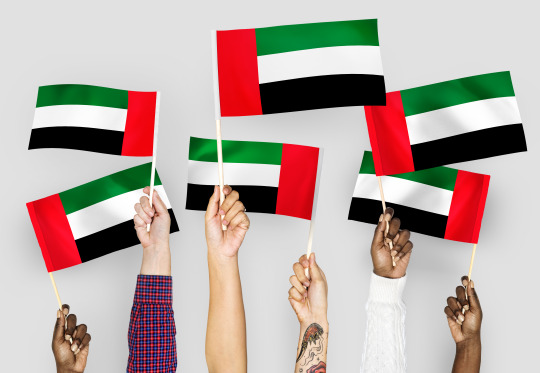
UAE National Day is a significant occasion for the whole country. This occasion provides an excellent opportunity to connect with clients, partners, and employees by presenting them with thoughtful and meaningful corporate gifts from Royal Top Trading.
Customized UAE National Day Merchandise:
Gift your employees customized UAE National Day merchandise. Consider items such as t-shirts, wristbands, caps, or keychains featuring the UAE flag, or national symbols with your brand logo.
UAE-themed Gift Hampers:
Delight your employees with UAE-themed gift hampers filled with local delicacies and cultural treats. Include items such as Arabic sweets, premium dates, or gourmet snacks. Incorporate your company’s branding with these and make them remember your company’s name.
Personalized Stationery:
Offer your employees personalized stationery items that combine functionality with a touch of UAE flair. Consider notebooks, pens, or desk accessories adorned with their initials alongside UAE-themed designs. This thoughtful gesture not only adds a personal touch but also encourages productivity and creativity in the workplace.
Wellness Gifts:
Prioritize your employees’ well-being by gifting wellness-related items. Consider options like, essential oil diffusers, aromatherapy sets, and stress-relief kits. These gifts demonstrate your commitment to their holistic well-being, encouraging a healthy work-life balance and promoting a positive atmosphere within the company.
Cultural Experiences:
Vouchers for traditional Emirati dining experiences, desert safaris, or visits to museums and cultural sites can create memorable moments of exploration and appreciation.
Tech Gadgets:
For a more modern gift, consider tech gadgets that align with your employees’ interests such as power banks, and USB flash drives (card USB, etc).
Personalized Appreciation Cards:
Accompany your corporate gifts with personalized appreciation cards.
By selecting thoughtful and personalized gifts, you can show your employees that their hard work is valued and that they are an integral part of your organization’s success. Whether it’s customized UAE-themed merchandise, wellness gifts, or cultural experiences, the right gift will leave a lasting impression
Royal Top Trading is your trusted corporate gifts supplier in Dubai. Our extensive range of premium corporate gifts allows us to help you leave a lasting impression on your clients, employees, and business associates. We serve all across the UAE including Abu Dhabi, Kuwait, Nigeria, Egypt, Qatar, Bahrain, Saudi Arabia, Oman, and South Africa.
Visit Our Website/ Catalogue to see our extensive selection of corporate gifts, and business gifts and we are confident you’ll find the perfect item for your next promotion. However, if you require assistance, our experienced team is always here to help.
Contact us today at +971 50 588 4169 to help you find the right corporate gifts/ promotional gifts for your organization that will leave a lasting impression on your clients/ employees
2 notes
·
View notes
Photo

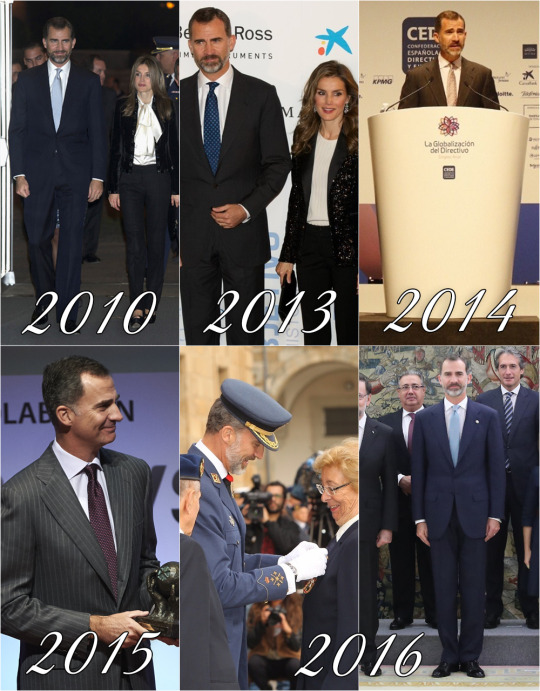
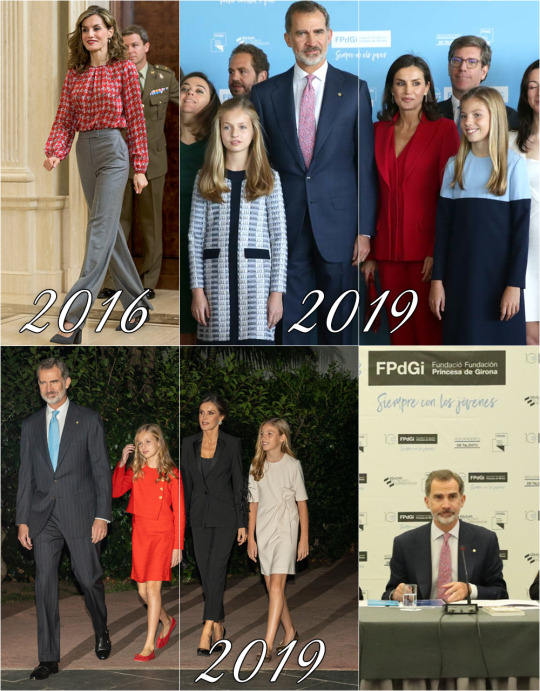
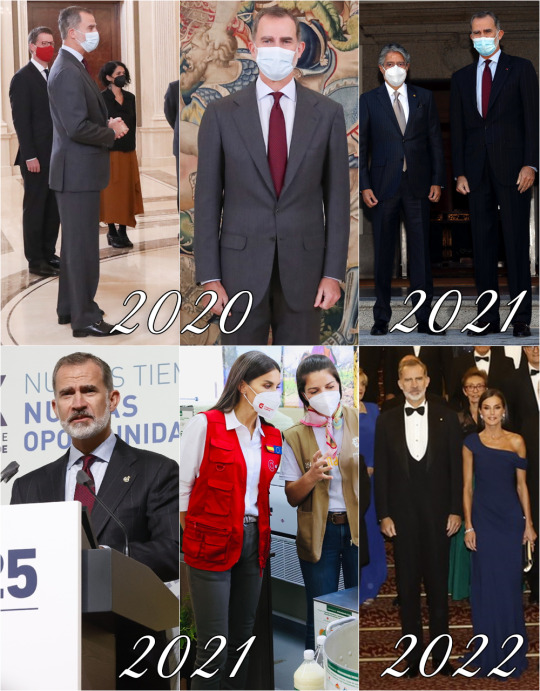
Felipe and Letizia retrospective: November 4th
2003: Met the representative of the Argentinan Central bank, Alfonso Prat-Gay.
2004: Met Emirati President Sheikh Khalifa bin Zayed al-Nahayan in Abu Dhabi & Opening of the IX Congress of the Latinoamerican History Academies Associations.
2006: Closing of the 4th Advanced Studies Seminar
2008: Opening of the 2008 Red Cross Fundraising Campaign, at the Foreign Affairs Ministry in Madrid
2009: 31st Privacy Protection Conference (1, 2).
2010: Concert for Codespa’s 25th anniversary.
2013: “La Razon” Newspaper 15th Anniversary in Madrid.
2014: Closing of the Annual Congress of the Spanish Confederation of Directors and Executives (CEDE)
2015: 2nd Awards of the Spanish Confederation of Small and Medium Enterprises (CEPYME) at the Reina Sofia Museum in Madrid
2016: 18th Veterans Day of the Spanish Armed Forces; Oversaw the oath of the new Government Ministers (1, 2) & Audiences at la Zarzuela
2019: Princess of Girona Awards
2020: Audience at la Zarzuela & Delivered the 30th and 31st FIES Journalism awards at la Zarzuela
2021: Meeting with with the President of Ecuador, Guillermo Lasso Mendoza; Closing of the 20th Congress of Directors CEDE & Cooperation visit to Paraguay - Day 2
2022: Event celebrating the 175th anniversary of the Círculo del Liceo
F&L Through the Years: 1080/??
#King Felipe#Queen Letizia#King Felipe of Spain#Queen Letizia of Spain#King Felipe VI#King Felipe VI of Spain#F&L Through the Years#November4
4 notes
·
View notes
Text
Hussain Al Nowais
Website: https://billionaires.africa/2021/06/24/emirati-investor-hussain-al-nowais-amea-power-launches-west-africas-largest-solar-plant-for-togolese-government/
Address: P.O Box: 54457, Abu Dhabi, UAE
Phone: +971 2 6918000
Business e-mail: [email protected]
Hussain Al Nowais is a global industrialist and business strategist with over 25 years’ experience in business management, banking, project finance, investment, industrial and real estate sectors. Mr. Al Nowais has a proven track-record in the development of industrial, infrastructure, and energy projects; and in the development and acquisition of businesses in the MENA region. Hussain Al Nowais is the founding member and Chairman of Al Nowais Investments. Currently, Mr. Al Nowais is spearheading the firm’s strategy of global expansion and strategic project development in energy, industry, infrastructure, oil & gas, healthcare, information technology, hospitality and real-estate.
Facebook: https://www.facebook.com/hussainnowais/
LinkedIn: https://www.linkedin.com/in/hussain-al-nowais-a5806959/
2 notes
·
View notes